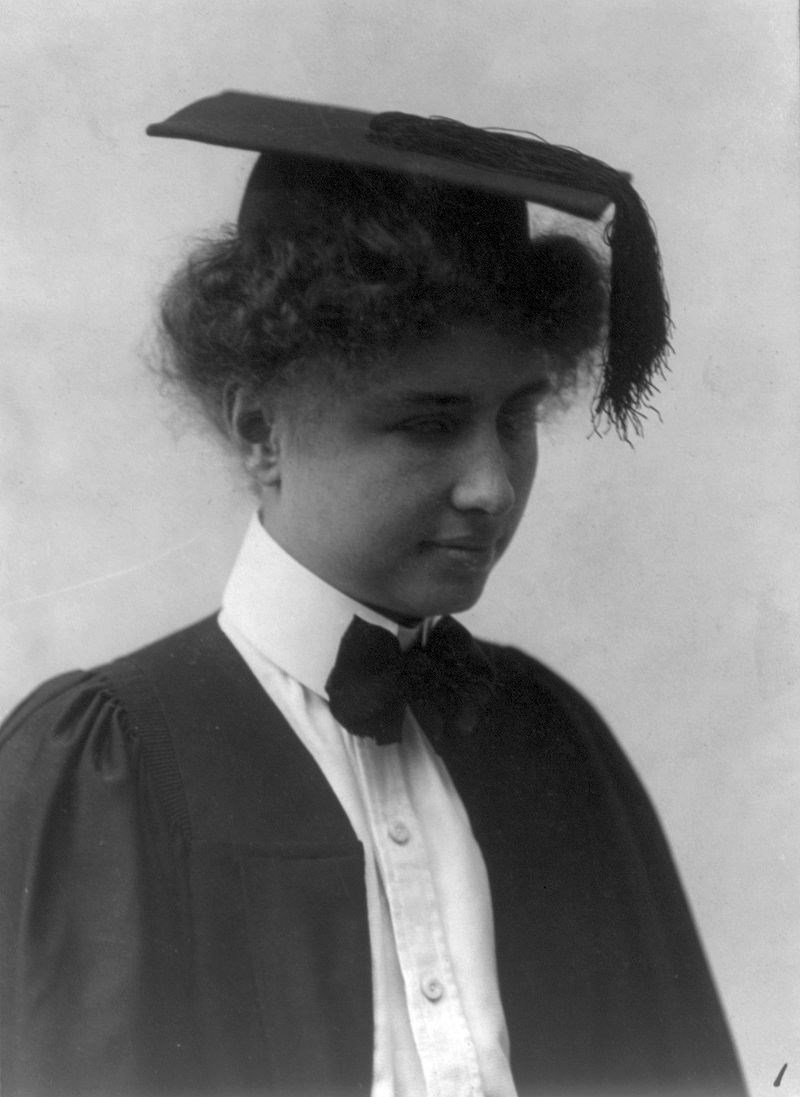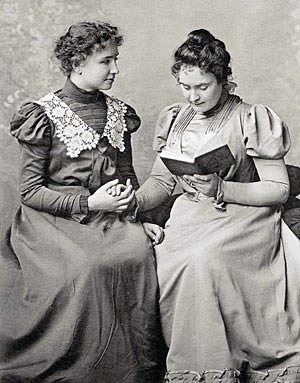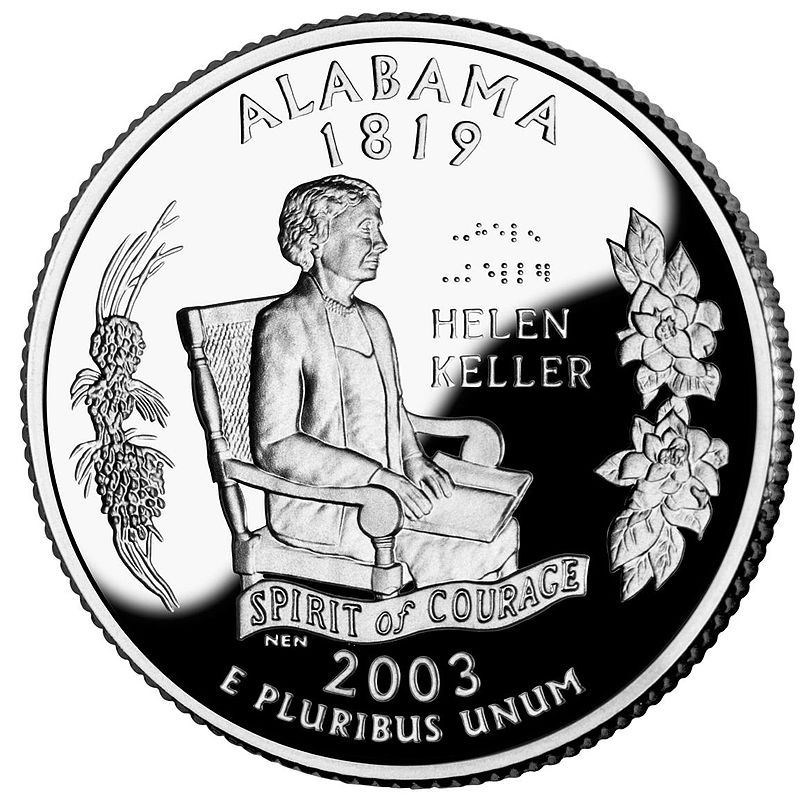 Helen Keller's graduation, 1904wikimedia commonsFear. Criticism, Lack of interest. These are just a few of the many things that holds people back from achieving their goals. "A hero is someone who rises above his or her fears and limitations to achieve something extraordinary ... a hero embodies what we believe is best in ourselves" (Fleming.) In his article “Review of Superman on the Couch: What Superheroes Really Tell Us about Ourselves and Our Society,” James R. Fleming defines a hero according to their traits and actions in that they surpass physical and mental restrictions for the sake of good. Popular media heavily influences America’s general view towards heroes through the portrayal of heroes as fictional, superhuman characters, but ordinary people can wield heroic qualities and motivations. Heroes conquers their own insecurities and physical boundaries in order to accomplish something beyond themselves that improves the lives of those around them. They do not let their fears bring them down; they do not let their boundaries box them into believing they alone do not have the ability to bring about the change they aspire to achieve. A heroic person can be a firefighter who runs headfirst into a forest fire for the sake of the safety of the towns behind him. A heroic person can be someone who speaks up to a bully at school. A heroic person can be a Marine stationed on the front lines who does his or her part every single day to ensure that American citizens can continue to live on in freedom. These people demonstrate courage and compassion. Additionally, through my eyes, a hero must ask herself, “What can I do to improve the lives of others?” This requires a sympathetic outlook on life and a brave soul that will not back down from a challenge. A hero is someone who courageously strives towards their goals and possesses compassion for other people.
Helen Keller's graduation, 1904wikimedia commonsFear. Criticism, Lack of interest. These are just a few of the many things that holds people back from achieving their goals. "A hero is someone who rises above his or her fears and limitations to achieve something extraordinary ... a hero embodies what we believe is best in ourselves" (Fleming.) In his article “Review of Superman on the Couch: What Superheroes Really Tell Us about Ourselves and Our Society,” James R. Fleming defines a hero according to their traits and actions in that they surpass physical and mental restrictions for the sake of good. Popular media heavily influences America’s general view towards heroes through the portrayal of heroes as fictional, superhuman characters, but ordinary people can wield heroic qualities and motivations. Heroes conquers their own insecurities and physical boundaries in order to accomplish something beyond themselves that improves the lives of those around them. They do not let their fears bring them down; they do not let their boundaries box them into believing they alone do not have the ability to bring about the change they aspire to achieve. A heroic person can be a firefighter who runs headfirst into a forest fire for the sake of the safety of the towns behind him. A heroic person can be someone who speaks up to a bully at school. A heroic person can be a Marine stationed on the front lines who does his or her part every single day to ensure that American citizens can continue to live on in freedom. These people demonstrate courage and compassion. Additionally, through my eyes, a hero must ask herself, “What can I do to improve the lives of others?” This requires a sympathetic outlook on life and a brave soul that will not back down from a challenge. A hero is someone who courageously strives towards their goals and possesses compassion for other people.
Someone who courageously strives towards their goals and harbors compassion for others is Helen Keller. Helen Keller was born on June 27, 1880 in Tuscombia, Alabama, growing up to become an author, social activist, and lecturer. However she is arguably most famous for her physical disabilities. When Helen was only 19 months old, she burned up with fever and contracted what the doctor described as an “acute congestion of the stomach and brain” (Keller 6), from which she recovered almost as quickly as she caught it. Her family celebrated when she recovered, although nobody knew that Helen Keller would never see or hear again. Despite her condition, the young girl strived to overcome her limitations, and with the aid of her teacher, Anne Sullivan, she succeeded. In 1903, she graduated Radcliffe College with a Bachelor’s degree. From then on, Helen dedicated herself to improving the treatment and education of handicapped individuals, always showing compassion towards those with similar misfortunes. Helen Keller died on June 1st, 1968 in Westport, Connecticut. A hero must possess courage and compassion. Courage is defined as having the mental or moral strength to venture, persevere, and withstand danger, fear, or difficulty, and compassion is to possess sympathetic pity and concern for the sufferings or misfortunes of others. With her daring courage and compassion that consistently brought hope to handicapped individuals, Helen Keller is an inspiration to all because she shows people how to believe in their strengths, and thus, deserves the title of a hero.
Helen Keller’s limitations and the strength she needed to overcome them make her a courageous hero worthy of admiration. She was described to have learned to communicate even with her condition: “Despite her loss of sight and hearing...Keller learned to express herself through the manual alphabet and to read Braille”(Gale). Helen may have been deaf and blind, but it did not stop her from reaching the people around her through the alphabet and Braille. She never allowed herself to despair at her loss of sight and hearing. Instead, she made them her pillars of strength. She was unable to communicate through normal means, but instead of letting that bring her down, she remarkably pierced through the darkness of despair to reach the shining light of hope. This is courageous because Helen, from a young age, was blind and deaf. For as long as she can remember, everything has been dark and silent, and all she could rely on was her sense of touch, yet she bravely plunged headfirst into the unknown world in order to obtain a way to communicate with the world; a way that would allow the blind person to see and the deaf person to hear. The world was an unknown place, an unknown concept to her, but she still found the courage within her to take her first steps into it. Helen also describes her struggles in her book, Story of My Life: “there is no royal road to the summit, I must zigzag it in my own way. I slip back many times, I fall, I stand still, I run against the edge of hidden obstacles, I lose my temper and find it again and keep it better, I trudge on, I gain a little, I feel encouraged, I get more eager and climb higher and begin to see the widening horizon. Every struggle is a victory. One more effort and I reach the luminous cloud, the blue depths of the sky, the uplands of my desire”(Keller 39). Helen describes the feeling of struggling in ways that others who are more fortunate than herself do not. When she says that she must ‘zigzag’ the path ‘in her own way’, she refers to the fact that she has to find alternative methods to learn if she is to succeed. Despite the ‘hidden obstacles’, referring to her blindness and deafness which essentially seals her mind in eternal darkness and silence, she fights on. This displays Helen’s courageousness once again because she faces obstacles that most people do not face, and she still meets them head on and never retreats even if she trips or comes to a halt. This trait helped her to finally attain her goal of promoting education for people like her. Helen Keller’s courageousness makes her a hero because it gave her strength to speak up and fight for the right to knowledge for those privy to misfortune that none should have to experience.
 Helen Keller with Anne Sullivan, 1888Photo courtesy of Wikimeda commons [Public Domain]By advocating for reforms for the handicapped, Helen Keller demonstrates heroism through her compassion towards disabled individuals. Helen, in her book, explains her reason for dedicating her life to the education reforms: “I think you would have some idea of the value of speech to the deaf, and you would understand why I want every little deaf child in all this great world to have an opportunity to learn to speak” (Keller 175). Helen speaks of her goal to give all deaf children the opportunity to be able to communicate normally with their peers. She speaks with the understanding of someone who knows what it was like to be encased in a world of silence. Her dedication to succeed by her own powers had transformed into a determination to set free every child unfortunate enough to possess a handicap. Her sympathy towards those suffering similar misfortunes makes her compassionate. She used this compassion to speak out for them and to advocate for ways to educate them. As the article Helen Keller by Gale Databases adds, “Keller's triumph over ignorance was followed by her triumph over public indifference to the welfare of the handicapped. She devoted the rest of her life to the promotion of social reforms aimed at bettering the education and treatment of the blind, the deaf, the mute, and, in effect, all handicapped individuals” (Gale). Keller did not stop at raising awareness to the general population about the struggles of handicapped, she went a step further and conquered the public’s disinterest for their welfare. Improving the treatment of the handicapped became her lifelong passion. Helen could have stopped after she brought success to herself, but she projected herself out to the world in order to give all disadvantaged people the chance for education and achievement that she was able to obtain. This also shows her compassion towards them and how she refused to forget where she came from. Helen would never allow someone to remain in isolation if she had the power to help them. The compassion she displays shows the character of a true hero because she used it to improve the qualities of other people. Instead of stopping at her personal success, her compassion motivated her to make success possible for all other disadvantaged children.
Helen Keller with Anne Sullivan, 1888Photo courtesy of Wikimeda commons [Public Domain]By advocating for reforms for the handicapped, Helen Keller demonstrates heroism through her compassion towards disabled individuals. Helen, in her book, explains her reason for dedicating her life to the education reforms: “I think you would have some idea of the value of speech to the deaf, and you would understand why I want every little deaf child in all this great world to have an opportunity to learn to speak” (Keller 175). Helen speaks of her goal to give all deaf children the opportunity to be able to communicate normally with their peers. She speaks with the understanding of someone who knows what it was like to be encased in a world of silence. Her dedication to succeed by her own powers had transformed into a determination to set free every child unfortunate enough to possess a handicap. Her sympathy towards those suffering similar misfortunes makes her compassionate. She used this compassion to speak out for them and to advocate for ways to educate them. As the article Helen Keller by Gale Databases adds, “Keller's triumph over ignorance was followed by her triumph over public indifference to the welfare of the handicapped. She devoted the rest of her life to the promotion of social reforms aimed at bettering the education and treatment of the blind, the deaf, the mute, and, in effect, all handicapped individuals” (Gale). Keller did not stop at raising awareness to the general population about the struggles of handicapped, she went a step further and conquered the public’s disinterest for their welfare. Improving the treatment of the handicapped became her lifelong passion. Helen could have stopped after she brought success to herself, but she projected herself out to the world in order to give all disadvantaged people the chance for education and achievement that she was able to obtain. This also shows her compassion towards them and how she refused to forget where she came from. Helen would never allow someone to remain in isolation if she had the power to help them. The compassion she displays shows the character of a true hero because she used it to improve the qualities of other people. Instead of stopping at her personal success, her compassion motivated her to make success possible for all other disadvantaged children.
 Helen Keller on the Alabama state quarterPhoto courtesy of Wikimedia commons [Public Domain]Helen Keller’s courage and compassion to overcome her physical limitations and inspire others to do the same makes her a true hero. Her ability to strive past her limitations demonstrates the value of courage. In conquering her deafness and blindness in spite of how hard it was with two sensory organs rendered useless, she shows that she possesses the courage she needs to achieve her goals. Instead of stopping at her own personal success, however, she spent the rest of her life improving the lives of other disabled individuals, showing her compassion. Helen Keller became my hero in 4th grade. At that time, school became unexpectedly difficult for me, and I would constantly be unable to comprehend what was being taught. I started giving up, losing faith in my abilities. Going to school felt like the equivalent of eternal damnation. On a chance assignment back then, I came across a short biography of Helen Keller. Her story amazed me. A blind and deaf girl was able to scale the tallest of obstacles and come out on top. Not only that, but she improved education for all handicapped children in the United States. I never thought someone so amazing could exist. At that low point in my life, she inspired me to continue struggling through, no matter the challenge. Keller was my hero not because she was deaf and blind, but because she sacrificed her blood and sweat and tears to help herself and others. Now, each time the going gets rough or the binding tendrils of fear and insecurity threaten to squeeze me until I can’t breathe, I remember Helen Keller and the courage and compassion with which she lived her heroic life.
Helen Keller on the Alabama state quarterPhoto courtesy of Wikimedia commons [Public Domain]Helen Keller’s courage and compassion to overcome her physical limitations and inspire others to do the same makes her a true hero. Her ability to strive past her limitations demonstrates the value of courage. In conquering her deafness and blindness in spite of how hard it was with two sensory organs rendered useless, she shows that she possesses the courage she needs to achieve her goals. Instead of stopping at her own personal success, however, she spent the rest of her life improving the lives of other disabled individuals, showing her compassion. Helen Keller became my hero in 4th grade. At that time, school became unexpectedly difficult for me, and I would constantly be unable to comprehend what was being taught. I started giving up, losing faith in my abilities. Going to school felt like the equivalent of eternal damnation. On a chance assignment back then, I came across a short biography of Helen Keller. Her story amazed me. A blind and deaf girl was able to scale the tallest of obstacles and come out on top. Not only that, but she improved education for all handicapped children in the United States. I never thought someone so amazing could exist. At that low point in my life, she inspired me to continue struggling through, no matter the challenge. Keller was my hero not because she was deaf and blind, but because she sacrificed her blood and sweat and tears to help herself and others. Now, each time the going gets rough or the binding tendrils of fear and insecurity threaten to squeeze me until I can’t breathe, I remember Helen Keller and the courage and compassion with which she lived her heroic life.
Page created on 2/16/2019 7:01:23 AM
Last edited 6/29/2020 5:33:18 AM
Works Consulted
"Helen Adams Keller."
Dictionary of American Biography, Charles Scribner's Sons, 1988. Biography In Context, https://link.galegroup.com/apps/doc/BT2310009962/BIC?u=powa9245&sid=BIC&xid=19ec563b. Accessed 7 Jan. 2019
"Helen Keller."
Contemporary Heroes and Heroines, vol. 1, Gale, 1990. Biography In Context, https://link.galegroup.com/apps/doc/K1607000147/BIC?u=powa9245&sid=BIC&xid=d919829
Keller, Helen, and John Albert Macy. The Story of My Life. Amazon Classics, 2018.
“Keller, Helen.”
Social Welfare History Project, 5 Mar. 2018, socialwelfare.library.vcu.edu/people/keller-helen/
